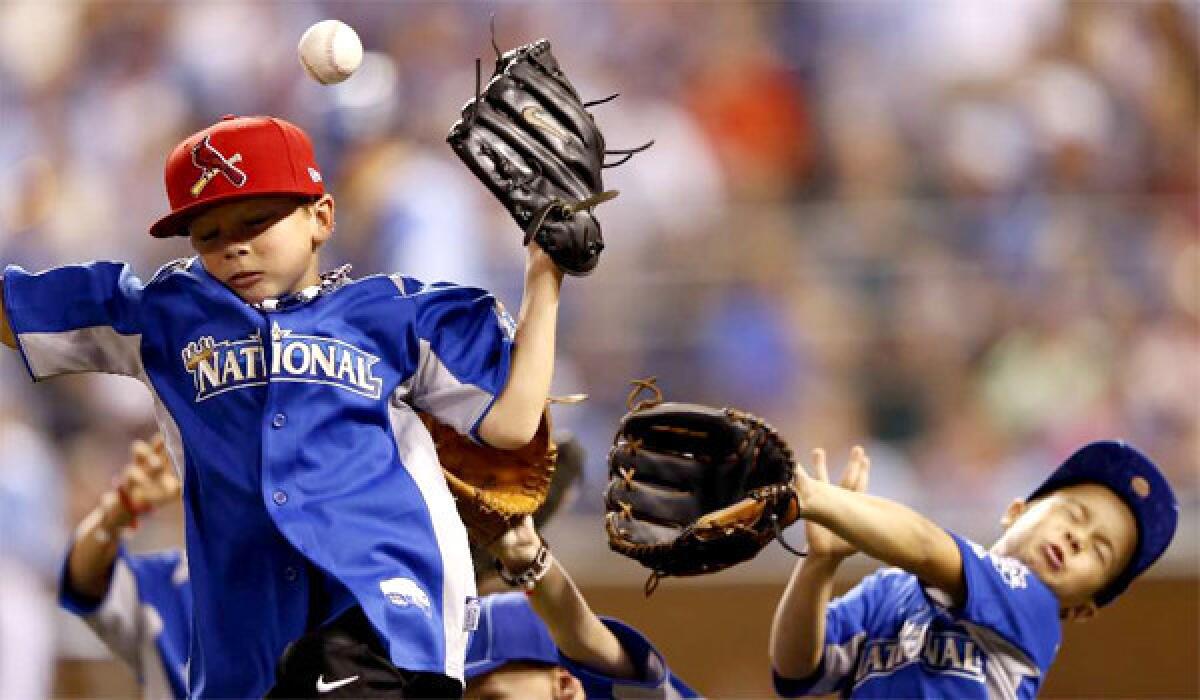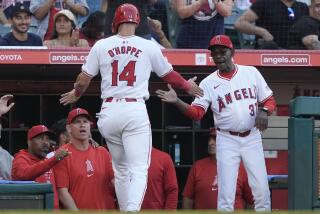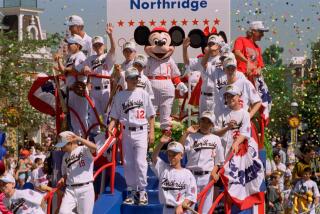Teaching baseball to his little Ponies

In youth baseball, there are certain laws of the game. The kid who canât hit a lick will always be first in line for snacks. The hitter with the most expensive bat will almost always finish last in home runs.
At almost any level, you canât buy a title â with equipment, with players. To even try futzes with the gods of baseball.
In our Pony League, there are no million-dollar contracts â not yet, anyway. We pay our 9- and 10-year-olds in pizza that tastes like it was trod upon by Russian tanks, reward them with home-baked brownies that their sisters put their grubby fingers in, ply them with too warm watermelon. Somehow thatâs enough.
At night, my own kid falls asleep in his batting stance, his hands folded up near his chin, elbows in a V, knees bent like a paratrooper. The hits he had earlier in the day still dance somewhere on his 10-year-old retinas.
Yep, there are certain laws of baseball, laws of life. You strike out more often than you go yard, the players with the dirtiest uniforms usually win.
Itâs not physics or karma exactly. Itâs just life.
In my experience, millionaires are hard of hearing, inclined to ignore even the most-obvious wisdoms. Thatâs why pro teams need a head coach who carries himself well. With coaches, itâs not so much the words as the body language, the gravitas. And no, gravitas is not a kind of grits. But you can buy it by the pound.
John Wooden invented gravitas. Joe Torre had it by the bucket. Guy named Jackson still does.
In fact, gravitas is how I came to coach the Angels of the Mustang Pony League, the gutsiest little group of 9- and 10-year-olds you probably never met.
Know how you use gravitas to reach a 9-year-old baserunner? You kneel down, wave your arms as if falling off the Queen Mary, and scream: âYOUâRE STEALING ON THE NEXT PITCH, OK? DO YOU HEAR ME, SKIPPY? YOUâRE GOING, GOING, GONE.â
Early on, Coach Matt and I decided that would be our secret sign for stealing: âYOUâRE GOING ON THE NEXT PITCH!!!â
Sometimes works, sometimes not.
Yes, I am on the hot seat. Just like every other L.A. coach.
We are winding up another youth baseball season, the car trunk a mess of bats and gear. I looked in my coachâs backpack the other day, and the bottom of it was covered with Jolly Ranchers and bubble gum.
If I have a coaching secret â and I donât have many â itâs to reward hitters for reaching third. Because once you reach third, you are 20 steps from true glory.
But home is where the heartache is. Itâs a tricky 20 steps, filled with codicils the kids donât fully understand â infield fly rules, tagging up and going on foul balls. Baseball is like renovating the master bath, full of situations you never imagined, and you only really understand it after youâve bungled things a few times.
I am torn now by one little nuance of the game â what would you do?
Back before the Crusades, I was an 8-year-old catcher, more grit than talent, really no talent at all.
But I discovered that if I slyly kicked dirt over home plate as soon as the ball was hit, that it often befuddled the runner coming in from third. For itâs hard enough to score when the world is exploding around you â catcherâs mask flying, balls ricocheting off the backstop, dogs barking, mothers passing out, civil defense sirens blaring â that to arrive at home plate and discover that the opposing catcher has buried it under an inch of brick dust ... well it messes with your soul.
So now as a coach, I am left with the moral dilemma: Do I pass along this fiendish little trick to 9-year-olds, or do I let them discover it for themselves?
Is burying home plate part of baseball, like an outfielder pretending he caught a trapped ball?
Or is it worse than that?
So far, I have not passed this trick along, and I think I never will. Baseball is losing enough kids to lacrosse and as it is, a great and troubling migration.
Last thing it needs is for a kid â who like mine falls asleep in his batting stance â to punch his first potential homer into the gap, only to arrive at home plate to find there is no home plate.
Baseball â and life â are already hard enough.
twitter.com/erskinetimes
More to Read
Go beyond the scoreboard
Get the latest on L.A.'s teams in the daily Sports Report newsletter.
You may occasionally receive promotional content from the Los Angeles Times.











